Rock climbing is an exhilarating, intimidating, and challenging extreme sport. Even pro climbers are highly concentrated while climbing and constantly learning new techniques. Rock climbing benefits climbers a lot: It improves the cardiopulmonary function, strengthens tendons and bones, boosts self-confidence, and builds up your ability to concentrate on things. Thus, more and more people start rock climbing.
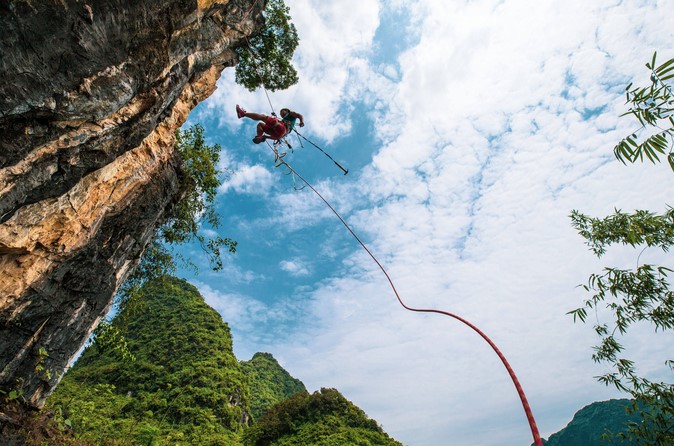
If you are just starting out with rock climbing, you will have much to learn. From climbing gear to warm-ups and climbing footwork tips to nutrition essentials, you must be fully prepared to avoid getting into minefields.
1. Precautions
Rock climbing is not suitable for everyone. Specifically, you should pay attention to the following things before taking up the event:
- People who suffer from high blood pressure, heat trouble, mental illness, or low back pain, have undergone surgery in the past six months, or are drunk and drug addicted are not suitable to participate in or watch rock climbing. Thus, take care of yourself.
- Minors should engage in or watch rock climbing with guardian’s permission.
- Don’t bring hard objects with you before climbing, such as mobile phones, watches, jewelry, wallets, or metal accessories, in case of injuring yourself or others behind you if falling off. Please take it off and keep it properly if you have to. You can store them into the Biometric Privacy Safe and secure it near the rest area.
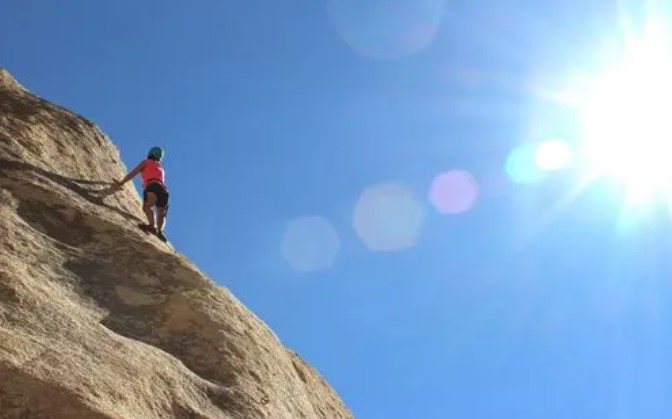
2. Select the Good-quality Climbing Gear
Wearing unsuitable climbing outfit makes you more vulnerable to injuries and renting new equipment each time costs you a big sum of fortune. If you are committed to rock climbing in the foreseeable future, it would be better to purchase your own gear as a long-term investment.
Although it will cost you a lump sum initially, the investment is worthwhile in the long run if you plan to go climbing regularly.
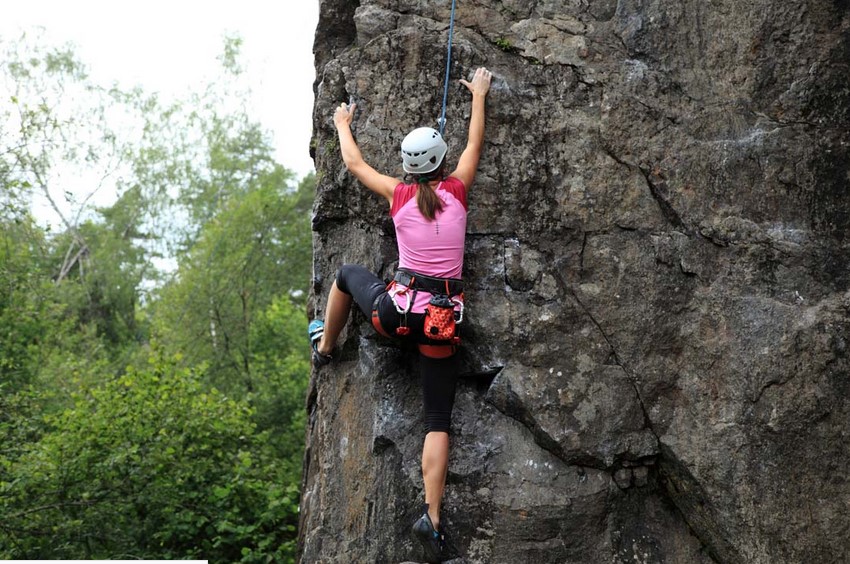
However, you don’t need everything as a beginner. Here’s the essential items you will need most:
- Beginner climbing shoes
- Chalks and chalk bag
- Sport climbing harness
- Sport climbing belay device
- Sport climbing carabiner
- Helmet
3. Understand the Climbing Disciplines
Depending on different gear and types of rock climbing, there are various disciplines. Maybe you’ve seen images of climbers hanging ropes from hundreds of feet above the ground. Well, that’s just one way to participate in the sport. There are also other forms of climbing to keep you near the ground either indoors or outdoors, like top-roping or bouldering.
Bouldering
Most bouldering routes are not that high — you can jump off without effort. Thus, it only requires climbing shoes, a chalk bag, a crash pad (cushion your jump or fall-off), and experienced spotters (guide your landing).
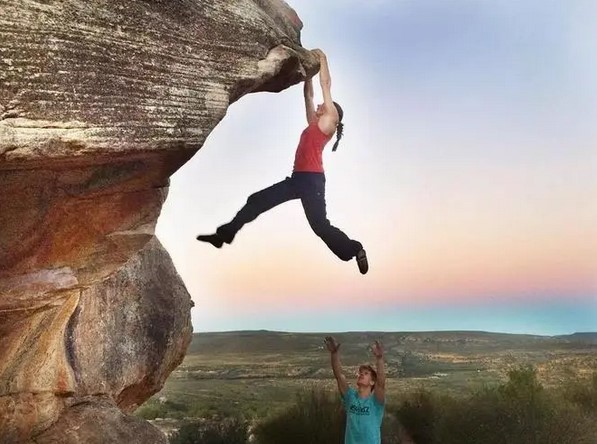
Top-roping
Top-roping brings you higher off the ground than bouldering and the climbers use a rope for protection by tying one end of the rope on their waists and the other end passing through an anchor at the top of the route. As the climber clambers, the belayer retracts the rope on the other end with a belay device.
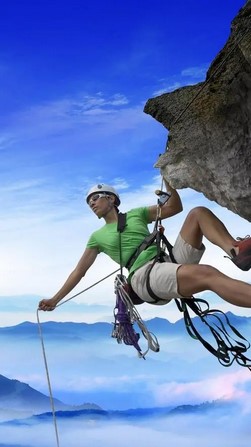
More Advanced Climbing
Except for the above types, you may also be curious about traditional lead climbing or sport lead climbing. Those advanced outdoor roped climbing often doesn’t have a guide or experienced climber. So you will need to learn essential skills from a training before you start off.
4. Get an Instructor
It is naive to reach the highest level of rock climbing without the help of an instructor or trainer. Because new skills are keys to succeed in rock climbing, it’s best to acquire them from an experienced professional.
For rock-climbing beginners, going to a climbing gym where instructors are available is great. You will get face-to-face instruction from a qualified rock climbing instructor and improve your climbing techniques. If you are lucky enough, you may meet a member from a reputable organization like the British Mountaineering Council, who will show you passion, expertise, and dynamic about rock climbing.
5. Warm-ups
Like many other sports, rock climbing also requires proper warm-ups to move your muscles and bones and avoid injuries during climbing. Please ensure an adequate and regular warm-up exercise in your climbing preparations and make it a habit as early as possible.
Try anything that loosen you up — wrist and ankle circles, jumping jacks, leg swings, squats, lunges, push-ups, etc. Before that, remember to keep your cellphone, watch, cards, keys, and something like that into the Biometric Privacy Safe if you have taken them to the climbing spot.
Besides, you should also work on your core strength. Being au fait with yoga, pilates, or gymnastics gives you a leg up on the climbing wall. Don’t panic if you are not, a lot of approaches will help exercise your core at gym or home.
6. Find a Partner
It’s better for beginners to get a partner in climbs. They may not be an instructor, but will support you in your first few climbs and exchange experience with you. When you start your first few climbs, climbing in pairs greatly helps you maintain your motivation and improve your confidence to make progress.
7. Practice the “Silent Feet” Approach
Don’t blame yourself if your footwork is all over the place on your first few climbs. It’s normal because new climbers just look upwards rather than their feet. You can start practicing the “silent feet” method to improve your footwork. Try not to make any noise when placing your feet on the footholds — ideally, it should be silent. Don’t worry if you make some noise at first few trials. Pay more attention on your feet while climbing and keep trying until you can make it naturally.
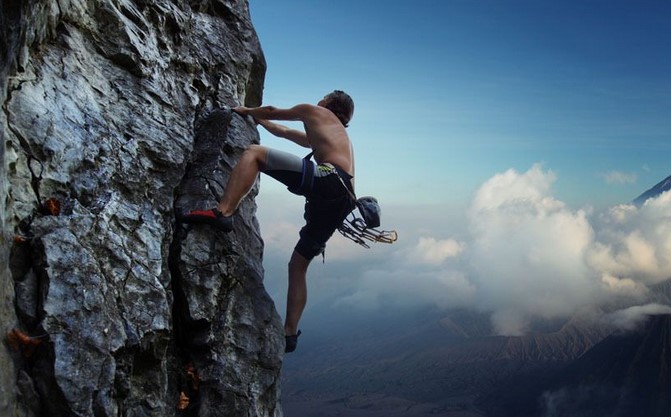
8. Attend a Professional Rock Climbing Event
Professional climbing event is necessary for beginners since you will learn from experts and exchange climbing experience. Go with a pen, notepad, and a camera, admire the techniques, and get inspiration from it. You might even find a new climbing partner for yourself!
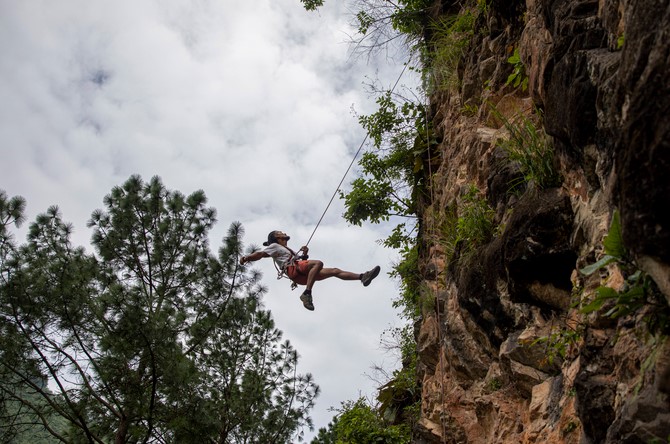
9. Practice Falling Off
Every climbers may inevitably fall off the rock. Hence, you might as well purposely spend time practicing falling off to correct your posture and prevent injuries when it happens for real. Even though your instructor will guide you through this, here are some key points you cannot ignore:
- If you are using a rope, ensure to keep the rope in front of your feet all the time and avoid it getting tangled. Or you may flip upside down if you fall.
- Fully communicate with your belay partner before you come off the wall.
- Don’t forcefully push yourself off the wall since you will collide with the wall rapidly and get injured.
Then, three steps to fall down:
- Come off the wall
- Fall down slowly
- Land the ground
10. Mind Your Nutrition
All rock climbers with a fit, muscular, and healthy physique take good care of their diets. Rock climbing will burn a lot of calories since most of your body muscles gets involved in it. Thus, it’s better to mind your nutrition when doing such strenuous sports.
Below are the diet plans for your reference:
- Before climbs: Eat a variety of healthy fats like avocados, proteins, carbohydrates, and nuts.
- During climbs: Keep your energy level up with quick sugars.
- After climbs: Refuel your body with brown rice and potatoes and recover your muscles with proteins.

Now you have referred to so many guidance, enjoy climbing to your heart content. Never forget why you started the rock climbing. If you easily get frustrated at the beginning, walk away and take a break. In the long run, having fun will make you more a competent climber, right?



